Candidate T-Shirts: Electioneering or Free Speech?
Pennsylvania is fighting over rules banning the wear of campaign clothing at the polling booth.
Sue Nace is photographed at her home in Red Lion, Pa., Wednesday, Oct. 1, 2008. What to wear on Election Day could become a serious question for Pennsylvania voters as a state court considers whether to ban campaign buttons, T-shirts and other apparel from polling places. (AP Photo/Carolyn Kaster)
Sue Nace thought election volunteers were joking when they told her she would have to remove her T-shirt to vote in the presidential primary last spring. But it was no laughing matter to the poll workers-turned-fashion police, who said Nace’s Obama shirt was inappropriate electioneering — and made her cover the writing before casting a ballot.
Now, a political fight over what voters can wear to the polls is headed to court in Pennsylvania — with the Republican Party favoring a dress code and Democrats opposed. To the GOP, the lack of rules could open the door to all kinds of questionable displays — even, one Republican leader suggested, something as outlandish as a musical hat. To the Democrats, voters should be free to express themselves. They fear a dress code could scare away some new voters.
[…]
But two Pittsburgh-area elections officials sued to have the memo rescinded. Their lawsuit warned that if the memo stands, “nothing would prevent a partisan group from synchronizing a battalion of like-minded individuals … to descend on a polling place, presenting a domineering, united front, certain to dissuade the average citizen who may privately hold different beliefs.”
I’ve long been dubious of these sort of electioneering rules, never understanding precisely what public interest was so great as to justify overturning people’s right to free speech. How many people really show up at the voting booth prepared to vote for Candidate A but wind up voting instead for Candidate B because they happened to see a sign 97 feet from the door? It seems to me we’d be far better off figuring out how to keep people that stupid and impressionable from voting, period, rather than trying to priviledge their latest whim as somehow binding.
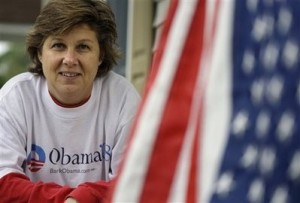

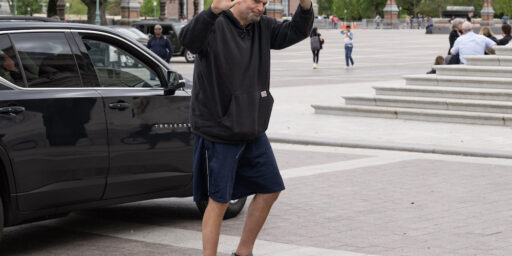
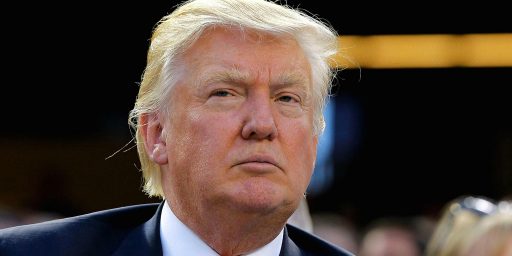
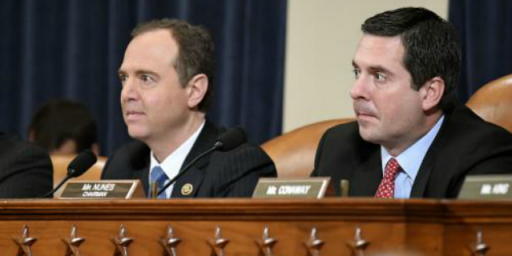
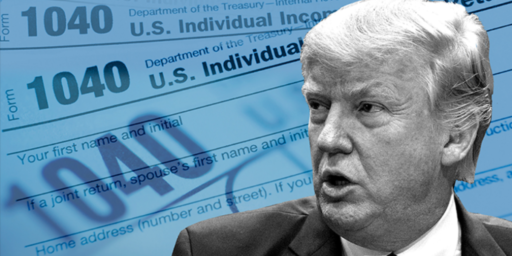

Having faced exactly these sorts of issues as an election judge I think it’s reasonable for the rules to be simple enough that election judges aren’t put in the position of needing to make fine subjective interpretations on what is allowable and what isn’t. The rationale behind “no electioneering“ laws is to prevent intimidation of voters and I think that’s reasonable. If the regulation is that anything goes, I think that’s reasonable, too. Making me measure the size of pins or slogans and either ban them or allow them isn’t reasonable.
Complete prohibition of any election materials is the easiest to administer but a reasonableness standard should also prevail. I’ve never turned anybody away from the polls for wearing campaign materials and wouldn’t. Voting is their right, after all. I might have asked somebody to zip up his or her coat now and again.
BTW there a summary of state laws on the subject here. An informed citizen should know what the applicable regulations are in his or her area.
I think requiring election workers to not have t-shirts or buttons and the like is reasonable. Prohibiting pamphlets or other fliers, or obvious campaign representatives from being within a certain number feet is reasonable.
But I think a voter should be able to wear their t-shirts or buttons when they come to vote, it just seems ridiculous to turn them away as voters for a t-shirt at least-I guess a button can be easily removed and put in a pocket.
Years ago I went to vote and my husband was on the ballot (county office, nothing big) I had our youngest with me. I was told the t-shirt (of the vote for Dad type) my 3 year-old had on was a problem. They were very nice, suggesting he take it off, turn it inside out, cover it up, etc. I don’t remember what I did but I voted. I may have been slightly inconvenienced, maybe a little annoyed (seemed like a silly rule) but mostly I think I was just embarrassed I didn’t know the rules. Not a big deal. Of course, I never made the same mistake or had any further problems.
Imagine walking into a voting location where all were wearing paraphernalia advertising the candidate you were not intending to vote for. Think of, oh, I dunno, say, Washington, DC.
Imagine further that your decision to vote for the unpopular guy was a narrow one, one that took a certain amount of bravery on your part to even consider.
Might one reasonbly be intimidated by the sheer preponderance and unanimity of other-oriented materials to not vote the selection one reluctantly chose? Might one feel coerced to vote in another direction? Might one chicken out at the very last minute due to fear of reprisal? (Yes, we all know the ballot is secret, except in places where they aren’t.)
I’m perfectly fine with ‘no partisan materials’ within the balloting area laws. ‘No,’ means ‘no,’ as in the absolute sense: zero, zip, nada. Partisan t-shirts, safari suits, bikinis, full-body tattoos, pins, flags, flyers: not permitted in the voting area.
By all means, the law and its interpretation should be well broadcast prior to elections. But sending someone away to take off a pin or turn a t-shirt inside out or cover it up seems perfectly reasonable to me.
BTW, anyone have a correlation between areas in which this is seen as an affront to the First Amendment and those which argue against voter photo ID?
James, I agree with Dave: The point is to avoid intimidation, not all sorts of influence.
A very good friend of mine — a fellow lawyer and a staunch yellow-dog Democrat — who’s about six feet tall and was then well over 300 pounds had volunteered to do some poll-watching for the Democratic Party in Louisiana in 2004. He wasn’t an election judge, but rather was on the lookout for “GOP dirty tricks” (in which my friend believes as an article of faith, evidence or lack thereof notwithstanding). But through an odd confluence of mix-ups and screw-ups in making plans, he ended up having to take along the family dog, a large German shepherd, and his wife ended up dropping them both off at a remote polling location in some rural parish, most of whose voters were black. And he was, of course, wearing comfortable clothing suitable for a warm Louisiana fall day, not his lawyer duds.
My friend didn’t see any GOP dirty tricks or intimidation. But as he and his dog waited, the dog became more and more perturbed by the strange surroundings, working itself up into a barking, snarling frenzy. Never mind that my friend is a Democrat and even Jewish: He looked, to all the world (and to most of the would-be voters), like Bubba from the Backwoods there with Rex to eat up some colored folks who were there to vote for John Kerry.
He ended up having to wander nearby neighborhoods — no one would let him stay in one place for very long — until finally his wife picked him up when the polls closed.
I think it’s something else: voter confidence in the fairness of the system. How would your confidence level be affected if you entered a polling place and all the workers were wearing t-shirts, etc. for just one party?
I think that on election day campaigning should stop. Respect should be shown to those going to the polls to vote by restraining all overt signs of all political campaigns.
Hey, as long as they don’t get caught wearing an American flag – what the heck should we care.
We had an incident in CT where a state trooper who sometimes wrote letters in favor on one party’s position was censured and reassigned by his commanding officer and had to move his cruiser from the polling area because the other party claimed it was intimidating voters.
Wait until Obama comes in and starts his control stuff. Forget using those yard signs and learn to whisper and pass notes in the dark, because control will be acceptable to his many supporters.
I find it odd but not surprising that she would think it appropriate to wear a campaign ad at the polling place. I don’t care which party is at fault. As a Republican, I would be offended if someone was wearing a McCain ad because it might cause a voter for the opposition to wonder if they could trust the volunteer to handle their job duties in an unbiased way.
But some people don’t seem to view at that way. It doesn’t bother me that Gwen Ifil is writing a book for Obama or that she is in the tank for him, but it bothers me immensely that she didn’t disclose it until she was found out. Hard to imagine her objectivity when she can’t be trusted to do the right thing before she is forced to. I view a volunteer showing off his or her bias in the same way, regardless of whose party they’re for. There is nothing wrong with supporting a candidate, but there is a time and place for everything and when objectivity and neutrality are chief duties, then do them right or step aside.
True story: when my brother and his wife had to go to the polls to mark a ballot for Edwin Edwards in order to ensure the defeat of David Duke, they were told that they had to remove the clothespins that they were wearing clipped to their shirts, which were widely known to be an indicator of their voting choice in that election. 😉
We have very similar laws here in Missouri. Here in St. Louis City, it’s very common for the campaign workers, all decked out in matching campaign t-shirts, to swarm polling places in an area known to be favorable to the opponent, or where the vote could go either way. They tend to get very aggressive about promoting their candidate, and it tends to be very intimidating to supporters of the opposing candidate(s). Now, imagine a bunch of similarly attired “voters” inside the polling place, who “just happened” to need to take a very long time to cast their ballots. Just one more reason for voters to turn around and go home, since their votes are clearly not welcomed.
She DID disclose it before the campaigns agreed to using her as a moderator.